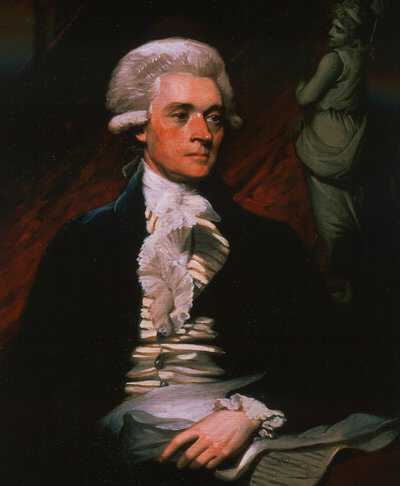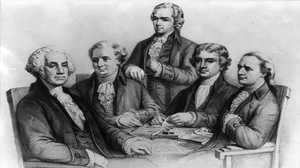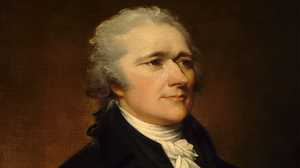The Dinner Table Bargain, June 1790
On a June evening in 1790, Thomas Jefferson hosted one of the most momentous dinner parties in U.S. history, one that would shape, and perhaps even save, the American republic.

Locating a Capital City
Jefferson had arrived in New York, then capital of the United States, in March 1790. The newly appointed Secretary of State had been abroad for five years, serving as American minister to France. But though he had missed the Constitutional Convention and subsequent ratification, Jefferson could not escape the aftermath. Two key issues had emerged. First, although the Constitution had mandated a seat of federal authority, it had not specified where, and 16 potential locations had been suggested, from New York to the banks of the Potomac River. The vast majority were in the north, leading Virginians like James Madison to fear loss of influence for the state that many still called their "country." Madison used all arguments at his disposal, including the Potomac site's proximity to George Washington's home at Mount Vernon. But the tide was against him in Congress, and by the spring of 1790 it appeared likely that the permanent capital would be placed somewhere geographically central, like Pennsylvania, where the Continental Congress had first met.
Strengthening National Government
The second issue did not spring from the Constitution itself, but rather from Treasury Secretary Alexander Hamilton's interpretation of it. A believer in strong central authority, Hamilton was convinced that the Constitution gave him the implied power to pursue fiscal policies that increased the national government's strength. One such policy was a federal assumption of all state debts, then estimated at about $25 million. Hamilton believed this policy would standardize the nation's accounts, help establish America's credit abroad, and make the federal government of necessity the chief taxing authority. Furthermore, it would bind the small group of wealthy businessmen who held most of the debt to the national government; as it prospered, so would they.
Loss of States' Control
That fact drew howls of protest from those, including many Virginians, who saw the nation's future in decentralized agrarian terms. To them the debt holders were enemies of American democracy, corrupt urban elites who would use their economic power to buy influence in Congress. Many had snatched up the debt for fractions of its face value from Revolutionary War veterans; now undeserving speculators would make all the profit. Furthermore, states like Virginia, which had paid off nearly all their debts, would now be forced through federal taxation to subsidize other states that had not. Far from helping states out, the federal government was taking control of their economies. "It seems to me," Revolutionary hero Henry Lee wrote Madison, "that we Southern people must be slaves in effect, or cut the Gordian knot at once. ... Is your love for the Constitution so ardent ... that it should produce ruin to your native country [Virginia]?" Madison, who had co-authored the pro-Constitution The Federalist with Hamilton, spoke out against the debt assumption plan, and the House voted Hamilton's proposal down in April 1790. Sectional tempers flared, and an impasse loomed.
Dinner and a Grand Compromise
It was against this backdrop that Jefferson ran into Hamilton one June day outside Washington's New York office. According to Jefferson, Hamilton looked "somb[er], haggard, and dejected beyond comparison." If assumption were definitively rejected, he would resign as Treasury Secretary, and Hamilton feared dire consequences for the republic. Though claiming ignorance as to the debate's specifics, Jefferson offered to host a dinner that would bring Hamilton and Madison together to discuss the situation. On the evening of June 20, they reached an accord; in exchange for Hamilton supporting the Potomac site, Madison would no longer block assumption in Congress and indeed would deliver crucial Virginia votes for the measure. This "dinner table bargain" played out in July; first the House voted on the 10th to approve the Potomac location, and then on the 26th, four Representatives from states bordering the Potomac switched their votes and Hamilton's assumption plan narrowly passed. A grand and lasting compromise had been achieved.
Fact vs. Legend
Though historians have judged Jefferson's account of the now legendary "dinner table bargain" to be largely truthful, it has self-serving aspects and does not present the whole picture. Far from being dreamt up in a single evening, the contours of the compromise were being negotiated before June 20; a number of meetings had been held between various interested parties, and Jefferson himself had participated in at least one of them. In addition, by the time of the dinner, Madison already had the votes he needed to win on the capital issue, though Hamilton did help smooth that bill's passage. What Virginia really got out of the evening (and Jefferson's account omits) was a $1.5 million lowering of her tax obligations under the assumption plan, at the time a considerable sum. It was a concession Hamilton was likely happy to make, since it enabled him to win the larger assumption battle. Federal financial policy would be shaped by his vision, not that of Virginia farmers, and in time Jefferson would come to denounce the dinner bargain, claiming Hamilton had duped him into it. But Jefferson would have at least one compensation; in March 1801 he became the first man to take the presidential oath of office in a new capital city built on the banks of the Potomac, just a short distance from Mount Vernon, that would be named Washington.







